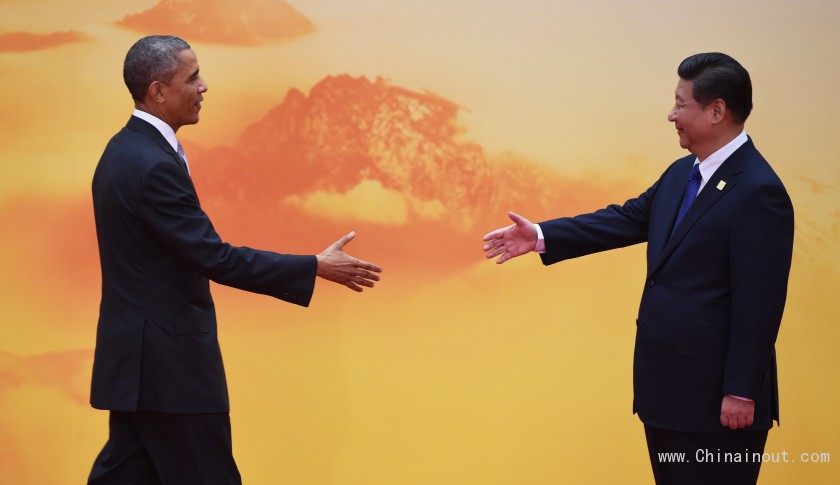美國自中國進(jìn)口的游戲機、全球定位系統(tǒng)(GPS)設(shè)備,、無線耳機以及其它許多高科技產(chǎn)品的價格有望下降,,雖說價格不會在今年圣誕假期就降下來。
本周二早些時候,,中美兩國達(dá)成了一項里程碑式的協(xié)議,,將互相削減多種高科技產(chǎn)品的關(guān)稅,。這為達(dá)成近20年來的首項信息技術(shù)全球性自由貿(mào)易協(xié)議鋪平了道路,。
隨著中國對某些處于行業(yè)領(lǐng)先地位的美國企業(yè)積極展開反壟斷調(diào)查,近來中美兩國的經(jīng)濟(jì)關(guān)系遭遇了一些波折,。而這項醞釀多年的協(xié)議,,是大受歡迎的利好消息。
據(jù)路透社(Reuters)報道,,美國貿(mào)易代表邁克爾o弗羅曼在于北京舉行的亞太經(jīng)合組織(Asia-Pacific Economic Cooperation)峰會會議間隙表示:“這對中美關(guān)系而言是令人鼓舞的消息,。”
“這表明中美在共同努力推進(jìn)雙邊經(jīng)濟(jì)議程,同時也在努力支持多邊貿(mào)易體系,。”
中國是全球最大的高科技設(shè)備出口國,,中美本周二達(dá)成的協(xié)議,,將提振今年增勢有所放緩的中國經(jīng)濟(jì),而且符合中國政府的戰(zhàn)略:推動國家經(jīng)濟(jì)向價值鏈上端轉(zhuǎn)移,,而不是一直做世界廉價工廠,。
同中方在APEC峰會間隙進(jìn)行雙邊會談后,美國總統(tǒng)奧巴馬公布了上述協(xié)議,。美國貿(mào)易代表辦公室在一份聲明中表示,,該協(xié)議將“允許更多‘美國制造’[的產(chǎn)品]無需征收繁重關(guān)稅就出口到更多市場,并幫助美國新增成千上萬個高薪制造業(yè)和高科技崗位,。”
該協(xié)議涵蓋了250多類原1996年《信息技術(shù)協(xié)議》(Information Technology Agreement)未包含的產(chǎn)品,。新加入《信息技術(shù)協(xié)議》的大部分產(chǎn)品,關(guān)稅將完全免除或大幅削減,。
該協(xié)議為位于日內(nèi)瓦的世界貿(mào)易組織(World Trade Organization)達(dá)成一項全球性協(xié)議鋪平了道路,,其時間可能在今年年底。不過,,現(xiàn)在還沒到下定論的時候,,因為日本和韓國等國可能有些尚待解決的問題。
《信息技術(shù)協(xié)議》覆蓋了每年約4萬億美元的全球貿(mào)易,,但自1996年以來,,該協(xié)議所涵蓋的產(chǎn)品類別從未擴充過。(中國進(jìn)出口網(wǎng))
It’s time to look forward to cheaper video game consoles, GPS devices, wireless headsets and a whole load of other high-tech goods–although not in time for this holiday season.
The U.S. and China reached a landmark agreement early Tuesday on cutting tariffs for a whole range of high-tech goods, paving the way for the first global agreement on free trade in information technology in nearly 20 years.

The deal, which has been years in the making, is a welcome piece of positive news in an economic relationship between the two countries that has run into trouble of late against a background of increased , with China aggressively pursuing some leading U.S. companies for alleged antitrust violations.
“This is encouraging news for the U.S.-China relationship,” Reuters quoted USTR Michael Froman as saying on the sidelines of meetings of the Asia-Pacific Economic Cooperation summit in Beijing.
“It shows how the U.S. and China work together to both advance our bilateral economic agenda but also to support the multilateral trading system.”
For China, which is by far the world’s biggest exporter of such equipment, the agreement is a welcome boost to an economy that has lost momentum this year, and fits with a government strategy of trying to move the country’s economy up the value chain, rather than having it stay the low-cost workhouse of the world.
The deal was announced by President Barack Obama after bilateral talks with China on the sidelines of the APEC summit. Froman’s office said in a statement it would “allow substantial expansion of ‘Made in America’… exports to growing markets without the imposition of burdensome tariffs, and support tens of thousands of well-paying U.S. manufacturing and technology jobs.”
The deal covers more than 250 types of product not included in the original 1996 Information Technology Agreement. As a result of bringing these products under the ITA, tariffs on most of them will either be cut entirely or substantially reduced.
The agreement paves the way for a global deal to be agreed at the World Trade Organization in Geneva, possibly by the end of the year. However, the last word still has to be spoken, as other countries such as Japan and South Korea will likely have issues of their own that need to be addressed.
The ITA covers some $4 trillion a year in global trade, but the list of products covered by it hasn’t been expanded since 1996.











